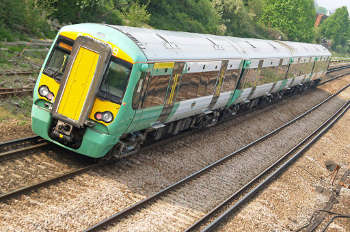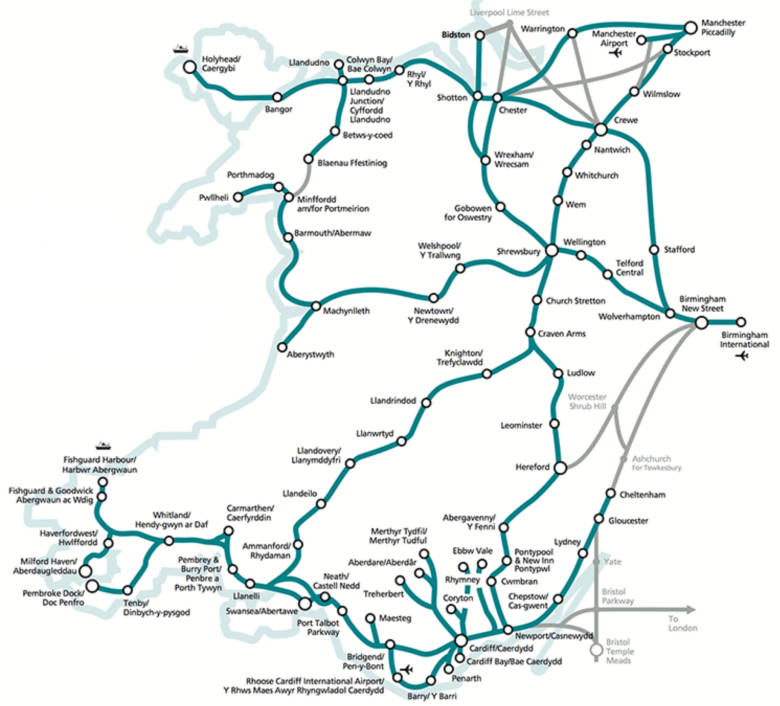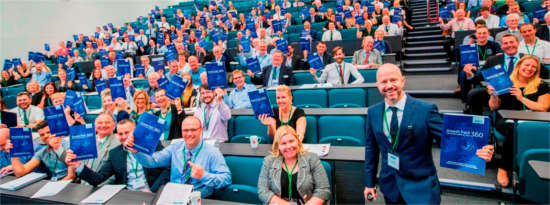Former chancellor George Osborne will no doubt be best remembered for his policy of austerity; however it was the nation’s flagging productivity that he called ‘the challenge of our time’.
The recent debacle on Southern rail services has done great damage to the output of the UK’s most productive area, the South East, highlighting once again the vital importance of efficient public transport. In short, if the trains start to slow, so does the economy.
Whisper it, but it’s possible that regions around the country will feel a little schadenfreude at London’s troubles, knowing that historic underinvestment has left them with sub-standard train services at the best of times.
Latest figures from IPPR North suggest the North of England is six-times less funded than London on infrastructure. The economic think tank claims England's North East is set to see £300 per person, the North West £290, Yorkshire & Humber £250, and London £1,900, for key infrastructure between 2016/17 and 2020/21.
According to the Office of National Statistics: ‘Nominal gross value added (GVA) per hour worked levels in 2015 ranged from 32% above the UK average in London to 19% below the UK average in Wales and Northern Ireland; the regions in the North and Midlands of England ranged between 10% to 15% below the UK average.’
Is this totally a coincidence?
Arguably, while growth is something that can happen with an investment boost, or a flash of success, productivity is something that has to be planned for.
Growth is a simple increase, productivity a complex efficiency. It is of course mathematically possible to have growth without an average increase in productivity. Something the UK’s rail network seems to have trying to prove for decades now.
One area that might have a painfully aware sense of this is Wales and its borders.
The Welsh Government claims that since 2011 ‘only around 1.5% of the rail enhancement expenditure across England and Wales has been made in the Wales Route areas’.
Bear in mind that the Wales and Border Franchise includes many cross-border services including Llandudno to Manchester Airport and Aberystwyth to Birmingham International, and two local routes entirely within England

Held at a red signal? Southern rail services
For the Southern franchise the DfT accepted all the revenue risk from train fares - surely a contributing factor to the current unrest. However in Wales something that was also headscratchingly odd happened.
A recent report from the House of Commons Welsh Affairs Committee states: ‘In 2018, the current Wales and Borders rail franchise will expire, which will bring to an end a 15-year agreement which had no allowance for growth in passenger numbers and no provision for extra train capacity. Since that franchise was first let in 2003, passenger numbers have increased by approximately 75%.
‘The result is that the people of Wales and Borders have been deprived of many improvements to the rail network that could have been expected, and this is a huge failure.’
Welsh infrastructure secretary Ken Skates and transport minister Paul Maynard both agree.
MPs were told the North Wales and Mersey Dee area has some of the highest car-based commuting mode shares anywhere in the UK, and that rail share is as low as 1% in some regions of Wales – surely no coincidence either.
This is a stark example, but sadly not alone. Mr Maynard told the committee that Northern Rail ‘also had a no-growth franchise that had a particularly damaging impact on the ability of the network to cope with passenger growth’.
How did this come about? The Wales contract was awarded by the now-abolished Strategic Rail Authority (SRA), whose powers have passed to the DfT.
Roger Cobbe, policy director at Arriva Trains, which won the franchise, told MPs the SRA was ‘wrestling with the tremendously difficult problem of the West Coast modernisation’ and that ‘essentially I think the SRA found itself with the most colossal budget crisis and at the same time it had franchises that needed re-letting, one of which was Wales and Borders’.
Mr Cobbe explained his company were told by the SRA ‘these are the trains you will have’, were told ‘not to think of procuring any new trains from anywhere else’ and informed ‘we do not have sufficient budget cover for even you, and you were the cheapest bidder’.
The result is rolling stock with an average age of 27 years, with the oldest being 40 years old – trains that were built when the Walkman was futuristic.
Quick question: Is it tragic or farcical that this sounds so familiar?
Last autumn, Network Rail announced that four electrification projects are being deferred - Oxford and Didcot Parkway, Filton Bank (Bristol Parkway to Bristol Temple Meads), Thingley Junction (Bath Spa to Bristol Temple Meads) and Thames Valley Branches (Henley & Windsor) - until the next rail investment period, from 2019 to 2024
What is the result of the deferral? According to the National Audit Office, the move shifts between £146m to £165m to other projects within the Great Western electrification programme.
This followed former minister Claire Perry – the one who was ashamed to be a rail minister – deciding to ‘pause’ electrification projects in the Midlands and the North after poor project delivery by Network Rail, leading to the Hendy Review in November 2015.
The review identified a £2.5bn black hole in Network Rail finances, which would be filled with a £1.8bn sale of assets and £700m of potential extra borrowing. Transport Network revealed in September that Network Rail is still considering options on how best to sell its silverware.
 Wales and Borders Franchise Route Map - Source Arriva
Wales and Borders Franchise Route Map - Source Arriva The Wales case study argues against the idea that it is privatisation, and its extra investment, that boosts train passenger numbers. The Wales and Borders franchise pretty much proves that numbers can go up even in the direst of circumstances.
In fairness to Arriva trains - and by extension lambasted operating companies the country over - it worked the growth to productivity equation the other way by introducing a better timetable at its own commercial risk.
‘It provided about 20% more train services for the same level of subsidy and it moved capacity to where it was needed more and where it would earn more,’ Mr Cobbe said.
It was also celebrated in the report for its excellent engineering, which kept the rolling stock on the track, for ‘consistently achieving high customer satisfaction’ and for ‘having made investments amounting to £35m over the franchise term, despite the contracted investment requirement being set at a minimal level of only £400,000 over the 15 year period’.
This in turn argues against the case put forward by unions that train companies are happy to let passengers suffer to maximise profits and that only nationalisation will place the network in the hands of those who can actually make it work.
Improvements seem to have been made with the devolution of powers to the Welsh Government.
By April 2006, the Welsh Government had the power to provide financial support to operators to develop Welsh services, and under the Joint Parties’ Agreement it was also responsible for management of the franchise.
Mr Skates says that since then the Welsh Government has invested ‘something in the region of £30m each year for extra services’.
It is now intended that the Welsh Government will take on the responsibility for specification and procurement of the 2018 rail franchise. According to different reports, Wales and Westminster have been working together well on this or despise each other.
However Simon Jones, director of transport and ICT infrastructure, Welsh Government, says it has entered into a formal agency agreement with the DfT as the bidding competition proceeds, while another agency agreement would ‘establish how cross-border considerations will be managed’.
The transfer of functions will mean that MPs in Westminster will not have a direct scrutiny role, creating an anomaly whereby residents in the English part of the franchise will have no such representation.
The Committee recommends that ‘a protocol be established whereby Members of Parliament for English constituencies can write to the Cabinet Secretary on behalf of constituents using the Wales and Border rail franchise services in England’.
Mr Skates has said he is willing to take up complaints about the rail franchise from English MPs in the same way as he does from Welsh AMs.
Another area of cooperation appears to be agreement on the geography of the franchise map. Mr Skates has allayed concerns that it would change, saying ‘we do not anticipate any significant changes to the map’.
‘Indeed, we have also reached agreement now, in principle, for the franchise to operate services from destinations in Wales to Bristol and to Liverpool.’
Mr Maynard also agreed that the franchise should stay as it is.
One function of the railways that is being retained by Westminster is the power to direct Network Rail. Something Mr Skates is not so happy about. He told MPs he ‘would have preferred the UK Government to agree to devolve funding for rail infrastructure and also perhaps to direct Network Rail, as Scotland already has’.
This should raise an eyebrow at a time when transport secretary Chris Grayling wants Network Rail and future franchise holders to share responsibility for track maintenance elsewhere in the UK. Unveiling his plans, Mr Grayling said: ‘When things go wrong, a lack of a joined up approach can make things much worse for the passenger.’ One could even go further perhaps, and say things go wrong because of a lack of a joined up approach.
There is also concern over the control Wales will be allowed to procure as they like. In October Transport Network revealed Welsh Government claims that Westminster is forcing it to award the next Wales and Borders franchise to a private operator, and vowed that the contract will include the very minimum required by law to meet the UK Government's demands.
Committee MPs highlight the Brown Review of rail franchising recommends, which recommends ‘the specification and oversight of franchises should be managed by authorities that are closest to their communities and local economies’.
Based on that recommendation, ‘it is vitally important that the local authorities and regional bodies, whether in Wales or England, have the opportunity to shape the next franchise specification’, the Committee report states.
‘We were told that such an approach, perhaps via a strategic forum, would strengthen the ability of the North Wales and Mersey Dee Rail Task Force to lever the benefits of rail in order to deliver the range of economic benefits set out in their Growth Track 360 Prospectus.’
The Growth Track 360 campaign was launched to secure £1bn of rail improvements to transform the North Wales and Cheshire regional economy and deliver 70,000 new jobs over 20 years. More than 400 companies have signed up to the campaign, employing roughly 300k people in the North Wales and Mersey area.

Ashley Rogers with Growth 360 supporters
Ashley Rogers, chair of the North Wales Business Council and member of the North Wales and Mersey Dee Rail Taskforce told Transport Network: ‘I think for me definitely devolving the franchise to Welsh Government is a good thing, because that gives us the flexibility on buying our own rolling stock for Wales. So we are not caught in that DfT trickle system for rolling system that exists elsewhere in the UK. It does seem that from what Ken Skates is saying the Welsh Government are looking seriously at that and we are quite confident.’
Everyone agrees that the next franchise from 2018 represents a major opportunity to improve the situation. Although it is also clear that major investment is needed in rolling stock and infrastructure.
The average speed from Bangor to Manchester is 37 mph; 34 mph from Holyhead to Bangor; and ‘Wrexham to Liverpool is an interstellar 24 miles an hour, which is actually slower than a horse,’ Mr Rogers says.
However it is also clear that new benchmarks and flexibilities are needed.
Mr Rogers says: ‘We need to make sure the franchise is flexible enough and is incentivised for growth, so if you look at slight changes of patterns of demand you can put more services in.
‘We have been looking at some finance options for station improvements including commercialisation of various areas of the station, broader contributions from adjacent developments utilising public assets and all this sort of stuff. As proposals develop around different stations we will work with the rail industry and public and private partners. I think we need to find a sustainable financial model, it can’t just be there is the cash for one lot of improvements because what happens in 5-15 years time. We end up in the same situation.’
The evidence from this case study and the local interest shown would suggest that the logic of devolution should come into play – allowing for a responsive, integrated system.
This system of transport devolution is already employed with Transport for London, which manages transport for a population larger than all of Wales, Liverpool, Manchester and Birmingham combined.
It does not mean ministers have to nationalise the rail system, but it does allow for public bodies to easily take over if there is a problem.
MPs recommend that ‘if after an advertisement for the franchise has been made, with all due diligence performed, and there is no confidence in any bidder… consideration be given to other models, such as a management contract operated by the Welsh Government through its not-for-dividend subsidiary Transport for Wales for at least five years’.
This is similar to the offer mayor Sadiq Khan maed on behalf of TfL during the Southern crisis, which was knocked back on shall we say somewhat contentious grounds. So contentious in fact that Conservative backbencher Bob Neill even called for Grayling to resign.
While the issues and history is complex, many would agree that Railtrack failed, the SRA also failed in the case of franchises like Wales’, the DfT sadly also failed when it came to the West Coast Mainline and unions and rail companies have failed passengers on Southern.
Devolution appears the last stop on the line and it is not outrageous to call for all change. All change please. Please, please, all change.
Register now for full access
Register just once to get unrestricted, real-time coverage of the issues and challenges facing UK transport and highways engineers.
Full website content includes the latest news, exclusive commentary from leading industry figures and detailed topical analysis of the highways, transportation, environment and place-shaping sectors.
Use the link below to register your details for full, free access.
Already a registered? Login